- Home
- Jude Hardin
Fugitive Page 7
Fugitive Read online
Page 7
“Micro-darts,” Colt said. “When will they start giving me some cool stuff like that?”
Diana ignored the question. “Walker won’t remember anything when he wakes up,” she said. “He’ll think he dozed off. It happens, even to marines.”
“He’ll probably make himself do some pushups or something.”
“You’re funny. Come on. We need to take him with us.”
“Why?”
Diana removed the handcuffs from Colt’s wrists. “Just push him in his chair,” she said. “It has wheels on it.”
Colt did as instructed, following Diane through a dimly-lit corridor to a semi-circular alcove. A pair of drinking fountains anchored the space, one for children and one for adults. Men’s room to the left, Women’s to the right.
Diana veered right.
“I’m not allowed to go in there,” Colt said.
“Didn’t stop you at the bar this afternoon.”
“Oh, yeah. I forgot about that.”
Still pushing the unconscious guard in his desk chair, Colt followed her around the bend and into a bay of sinks and mirrors and toilet stalls. There were eight stalls, and the one furthest from the entrance had an OUT OF ORDER sign taped to its door.
“Want to take a wild guess which one leads to the elevator shaft?” Diana said.
“It’s pretty obvious. What’s stopping someone from just ripping the sign off the door and walking on in?”
“In a civilized society, people are taught from an early age to follow the rules. It’s amazing how effective a little hand-printed sign can be. Anyway, the door is secured with an electromagnet, and there’s a web of laser beams connected to a silent alarm. If anyone tries to climb over or under, the security team is alerted instantaneously.”
“That must be where our friend Sergeant Walker comes in.”
“Exactly. Wheel him over to the stall.”
When they got over there, Diana opened the marine’s left breast pocket and fished out his military ID card. She slid it along the tight little gap between the door and its frame, and then she grabbed his right hand and pressed his thumb against an opaque black window imbedded under the latch, a circle about the size of a quarter. Colt looked down the row and noticed that all of the doors had identical windows in the same spots. He figured the others were just dummies, added for looks so that the real one wouldn’t stand out in the crowd.
Diana opened the stall door. No toilet. In its place was the world’s largest stainless steel crab pot covered with a wheel hatch.
“Should I take this guy back to his desk now?” Colt said.
“Yes. And try to hurry, would you? The magnet and the laser field will reactivate exactly five minutes from the time I scanned his thumbprint. People will come and we’ll be arrested and, well, you know the rest.”
Colt raced back to the lobby, positioned the guard as if he’d fallen asleep at the desk. It took about a minute. Maybe a minute and a half. Still plenty of time to get back and follow Diana into the crab pot before the alarm sounded.
But as Colt pivoted back toward the restroom, the marine’s head rose a few inches from the desk and he started mumbling something into his folded arms.
Sergeant Walker was waking up.
Colt considered punching him in the side of the head and knocking him out again, but he decided that might not be a very good idea. Diana had said that he wouldn’t remember anything when he woke up. A bruise, or any other sort of injury, would be an indication that he had been attacked, that the area had been penetrated.
So Colt didn’t do anything. While the guard was still groggy, he stepped away from the desk as quietly as he could, and then he trotted back to the restroom.
Diana was waiting by the stall door. “We have two minutes before the lasers are automatically reactivated,” she said. “You ready to do this?”
“He’s waking up.”
“What?”
“Sergeant Walker. He was starting to regain consciousness when I put him back at the desk.”
“That’s impossible. The drug is supposed to last at least an hour.”
“I guess Walker didn’t get the memo. What do you want to do?”
Diana thought about it. “Did he see you?”
“I don’t think so.”
“Good. The compound produces long term amnesia for short term memory. He won’t remember anything that happened an hour or so before the drug was administered, including us coming in and talking to him, so we should be okay.”
“As long as that part of the drug works as advertised,” Colt said.
“Yeah, and as long as he sits there at his desk and behaves himself for thirty minutes or so. I’ll hit him with another dart on the way out.”
“That leaves four for the rest of the job.”
“I know. It should be plenty.”
Diana grabbed the wheel on the hatch and started turning it counterclockwise. When she opened the lid, Colt looked inside and saw a narrow steel ladder leading to a grated steel platform about twenty feet below.
“You know I’m afraid of heights,” he said.
“Annex One is three hundred feet below sea level. We’re not going anywhere high.”
“Thanks. That’s reassuring.”
Colt took a deep breath and then followed Diana down the rabbit hole.
21
They lifted Felisa out of the trunk, carried her toward the sound of the diesel engine. There was a click, and then they lowered her into what felt like a carpeted cargo area. The back of an SUV, maybe. It was much more comfortable than the trunk of the car, and it smelled a lot better.
But it was still a cargo area, and Felisa was still bound and gagged and blindfolded. At least her ankle felt better, she thought, trying to find something positive to focus on. Attitude is everything, her father always said. Never give up. Hard work trumps talent every time.
And it had.
There were plenty of better singers out there, but persistence and a strong belief in herself had taken Felisa to the top of the pop music charts, and more recently to the number four show on television. Maybe she would have another chance to escape. As long as she was still breathing, there was still hope.
The hatch slammed shut, and a minute or so later the vehicle started moving.
Felisa knew that the popping noises she’d heard weren’t firecrackers. They were gunshots, from some kind of automatic weapon. Some kind of machinegun. The guy driving the SUV must have killed the mean one. Maybe Benny too, but Felisa didn’t think so. The second male voice a few minutes ago had sounded too much like him. It was him. She was almost sure of it. Which meant that Benny was in cahoots with someone else now. Maybe JR, the guy he’d accidentally mentioned earlier. The one who’d been driving the van when Felisa was abducted.
She was in the back of the SUV for about an hour. That was her estimate. It finally stopped and the hatch opened and a pair of hands untied her blindfold and her gag and her wrists. When she looked up, she saw a very tall man with broad shoulders and thick arms and bad teeth. He wore the dark circles of an insomniac, the areas around his eyes sunken and black and purple, contrasting sharply against the pallor of his cheeks and forehead.
Another man, a little shorter and a lot softer, stepped up beside him. “We don’t have our masks on,” he said. “She can see us.”
“It doesn’t matter anymore,” the tall man said. “She’s not going to live long enough to be a threat.”
“Are you sure?”
The shorter man was Benny. Felisa was certain this time. She recognized the voice. No doubt about it.
“I’m sure,” the tall man said. “Let’s get her in the house.”
He grabbed her by the upper part of her arm and lifted her out of the truck. Like a bag of groceries. That’s how strong he was. Benny walked away, and suddenly the area was bathed in bright light. Automatic flood lamps, Felisa thought.
“Are you JR?” she said.
“Don’t worry about it, baby.�
�
“I have money. I can give you—”
“Shut up.”
He shoved Felisa forward, pushing her toward a set of steps that led to the front door of a doublewide mobile home. There was nothing else around. Woods in every direction, and a narrow gravel driveway that doglegged sharply and disappeared into even more woods.
Benny walked up to the front door and held it open.
Felisa’s legs were numb from the ride, her knees weak and her gait unsteady, but she finally managed to climb the steps and walk inside under her own power.
There was a living room with nice furniture and lamps and pictures on the wall and bookcases. It looked like a normal house that normal people lived in.
But these people weren’t normal. They were killers.
Felisa decided to use the initials JR for the tall man, even if it wasn’t the same guy Benny had mentioned before. It probably was. And even if it wasn’t, the designation helped her keep things straight in her mind, which she felt that she might lose any minute now.
She sat on the couch.
JR walked in, and Benny shut the door.
“Time to celebrate,” JR said to Benny. “I’m going to have a beer. You want one?”
“I think I’ll smoke a joint.”
“Not in my house you won’t. Take it outside.”
“All right.”
Benny walked back outside, tripping the motion sensors on the floods again. The stark white brightness beamed through the curtains like a spotlight.
JR walked away, came back carrying a can of beer, a cheap brand that Felisa remembered drinking sometimes as a freshman in college.
“You want something to drink, baby?”
“Stop calling me baby,” Felisa said.
JR stepped closer to where she was sitting. She could smell him.
“What should I call you?” he said. “Darling? Sweetie pie?”
“My name’s Felisa Cayenne.”
“No it’s not. Anyone with a computer can look you up and see that your name isn’t really—”
“It’s not the name I was born with, but it’s the name I use now.”
“Yeah. And I guess it’s the name they’ll put on your tombstone.”
“I’m a millionaire,” Felisa said. “I can make you a millionaire.”
“I’m going to get there anyway, baby. And with no threat of the cops being involved. You’re my ticket to the big time. It’s a done deal. Nothing’s going to stop me now.”
No threat of the cops being involved. The mean one had said something similar, and now Felisa thought she had it figured out. These amateur thieves had somehow gotten in touch with Sam Gosswald’s family. Sam was on trial for murder, and Felisa had been scheduled to testify at his trial. Without her testimony, the prosecution was going to have a hard time proving its case.
United States Deputy Marshal Clete Garrison had been assigned to escort Felisa to Washington. Not that anyone expected Sam’s family to do anything. Nobody had ever threatened Felisa. The escort was strictly routine, a precautionary measure.
The Gosswalds had money. No history of violence, or any kind of crime, but Sam was their boy and it made sense that they would want Felisa to disappear forever.
So maybe that was it. Maybe Benny and JR were planning to sell Felisa to the Gosswalds.
JR guzzled the rest of the beer, crushed the can in his hand, walked away and came back carrying a fresh one. The trip to the refrigerator and back took about thirty seconds. Felisa had counted it off in her head.
“Do you read a lot?” Felisa said, nodding toward the bookcases.
“Does that surprise you?”
“No, just making conversation.”
“Don’t try to get too friendly. It’s not going to do you any good.”
“If you would just give me a chance,” she said. “I’ll double whatever they’re going to pay you.”
“They who?”
“The Gosswalds. That’s who you’ve been talking to, right?”
“Shut up, baby. You don’t know anything.”
A faint humming sound emanated from JR’s pants. He reached into his pocket, pulled his phone out and answered the call.
“Yeah,” he said.
He stood there with the device pressed to his ear while the person on the other end talked for a long time. Ten minutes, maybe more. He listened intently, taking a sip of beer every few seconds, and then he clicked off without saying another word.
As if he’d been sent a recording, maybe.
“Was that about me?” Felisa said.
“Of course it was about you. In less than twenty-four hours, I’m going to be a very rich man.”
He set the phone down on the coffee table, not far from where Felisa was sitting, and walked to the kitchen to get another beer.
Thirty seconds.
Plenty of time to call 911.
22
Colt descended into the tunnel, a silo roughly thirty feet in diameter with a staircase bolted to its perimeter. The elevator and its shaft were at the center of the grated steel platform. There were support beams and cables and pulleys and wiring, everything exposed, everything bare and naked and skeletal, a monstrous kaleidoscope of steel and concrete and electrical conduit disappearing into the blackness below.
“I think I’ve seen enough,” Colt said. “Can we go now?”
“This is the fun part. Come on. Just remember to put your head down and close your eyes. It helps with the vertigo.”
Diana stepped into the elevator and pulled out her ID case, the one loaded with knockout darts. Colt hesitated for a few seconds, knowing it might be his final action as a living breathing human being, and then he followed her into the chamber. She pulled a lever, and an expandable gate spread out over the opening. No solid door, just steel bars crisscrossing into diamond-shaped holes big enough to fit your arm through. A sign on the overhead panel said KEEP TO THE REAR OF THE LIFT.
Good idea, Colt thought.
There were three recessed buttons above the lever Diana had pulled, one with an arrow pointing upward, another with an arrow pointing downward, and one in the middle that said STOP. Diana pushed the one with the arrow pointing downward, and the floor beneath their feet started dropping rapidly. Like a boat anchor off a bridge.
“Tight quarters,” Colt said, his stomach somewhere near the back of his throat.
“Supposedly there’s room for three people, but it’s kind of like those compact sedans that are advertised to seat five. You have to be very close friends and skinny.”
“I’m assuming you’ve done this before.”
“The mission was a failure, and I don’t like to talk about failures. But I’m going to make it this time. The hard part’s over already.”
“I appreciate your help with this,” Colt said.
“No problem. Like I said, this is a vacation for me.”
“Sure. Just pretend we’re on a ride at a theme park.”
Diana laughed. “When we get to the lower level, there will be two guys sitting at a control console. I’ll hit them with darts, and then I’ll need you to stand one of them up to the retina scanner while I swipe the other’s ID card.”
“Then what?”
“Then the door to the library will slide open and we’ll have access to thousands of secret documents. There’s a card catalog, so all we have to do is look under Reacher and then walk to the location where his files are kept.”
“Sounds pretty simple. So why has it been so hard for The Circle to get down here before?”
“I told you I don’t like to talk about failures.”
The elevator slowed abruptly, as if it had been dropped into the ocean or something, as if it were sinking through water now instead of air, the rapid decrease in speed almost as gastrically traumatic as the initial freefall from the top.
“I guess we’re almost there,” Colt said.
“Yes. It won’t be long now.”
Colt paused, and then he said, “I
just want you to know that if we don’t—”
“Make it out of this alive? You’re not going to get all mushy on me now, are you? You’re not going to tell me what a pleasure it has been working with me and how much you appreciate everything I’ve done for you and all that, huh? You’re a good operative, Colt, and I want to see you do well in the organization. That’s what this is about. Nothing more, nothing less.”
“I was going to say that if we don’t do something fast, the guy standing down there waiting is probably going to shoot us with his machinegun.”
Diana lifted her head and opened her eyes.
She pressed the STOP button.
Repeatedly.
But the elevator kept going, its base finally resting against the concrete floor with a bone-jarring rattle.
The gate retracted.
The soldier with the automatic rifle stood in front of a curtain that ran from one side of the room to the other. Some sort of durable synthetic fabric, maybe the same stuff they used to make car covers and camping tents.
The guard slapped at the side of his neck, as if he’d been bitten by a mosquito or something.
“Who are you?” he said.
“I love what you’ve done with the place,” Diana said. “Amazing what some new drapes and a fresh coat of paint will do. Did you hire someone, or did you—”
“Ma’am, I need for you to identify yourself and state your purpose for being here.”
“Rhonda Webb, United States Deputy Marshal. And surely you know my purpose for being here, sergeant. If you don’t, then whoever was responsible for relaying the orders is in big trouble.”
The soldier licked his lips.
He looked nervous.
Confused.
“Nobody told me anything, Marshal Webb. I’m going to need for you to stay right there while I make a phone call.”
He reached for the cell phone clipped to his belt, but before he got his hand on it, his knees buckled and he fell to the floor. His feet twitched for a few seconds, and then he was still.
“You’re pretty good with those darts,” Colt said.

 Ricochet: The Jack Reacher Experiment Book 8
Ricochet: The Jack Reacher Experiment Book 8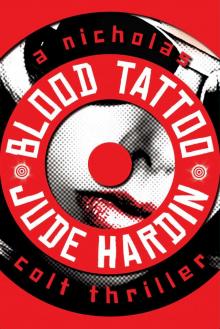 Blood Tattoo (A Nicholas Colt Thriller Book 5)
Blood Tattoo (A Nicholas Colt Thriller Book 5) Racked (A Lt. Jack Daniels / Nicholas Colt mystery)
Racked (A Lt. Jack Daniels / Nicholas Colt mystery)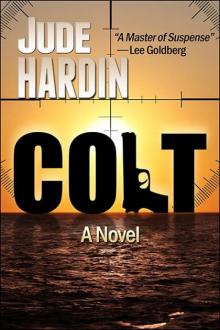 COLT (A Nicholas Colt Thriller)
COLT (A Nicholas Colt Thriller)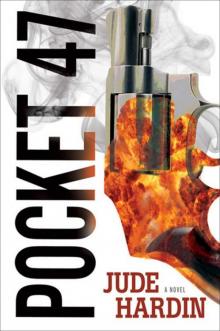 Pocket-47 (A Nicholas Colt Thriller)
Pocket-47 (A Nicholas Colt Thriller)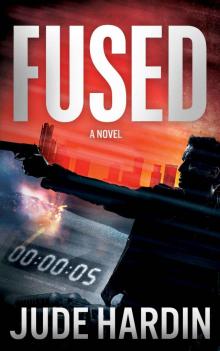 FUSED: iSEAL OMNIBUS EDITION (A Military Technothriller)
FUSED: iSEAL OMNIBUS EDITION (A Military Technothriller) THE JACK REACHER FILES: CHOKE 2 (Episode 2 in the CHOKE Series)
THE JACK REACHER FILES: CHOKE 2 (Episode 2 in the CHOKE Series) Snuff Tag 9 (A Nicholas Colt Thriller Book 3)
Snuff Tag 9 (A Nicholas Colt Thriller Book 3)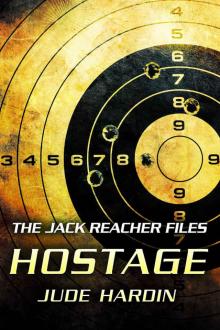 THE JACK REACHER FILES: HOSTAGE
THE JACK REACHER FILES: HOSTAGE THE JACK REACHER FILES: THE GIRL FROM THE WRONG SIDE OF CORDIAL (with Bonus Thriller THE BLOOD NOTEBOOKS)
THE JACK REACHER FILES: THE GIRL FROM THE WRONG SIDE OF CORDIAL (with Bonus Thriller THE BLOOD NOTEBOOKS) 3 TERRIFYING THRILLERS
3 TERRIFYING THRILLERS The Jack Reacher Files: Fugitive
The Jack Reacher Files: Fugitive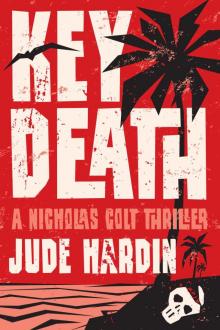 Key Death (A Nicholas Colt Thriller Book 4)
Key Death (A Nicholas Colt Thriller Book 4) SYCAMORE BLUFF (Prequel to THE JACK REACHER FILES: ANNEX 1) (A Nicholas Colt Thriller Book 8)
SYCAMORE BLUFF (Prequel to THE JACK REACHER FILES: ANNEX 1) (A Nicholas Colt Thriller Book 8) VELOCITY
VELOCITY Fire and Ice
Fire and Ice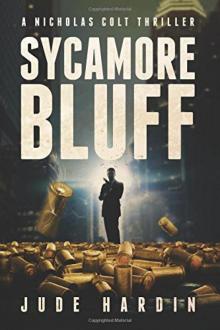 Sycamore Bluff
Sycamore Bluff Jack Reacher Files_Velocity
Jack Reacher Files_Velocity 357 Sunset
357 Sunset THE JACK REACHER FILES: CHOKE (Episode 1 in the CHOKE Series)
THE JACK REACHER FILES: CHOKE (Episode 1 in the CHOKE Series)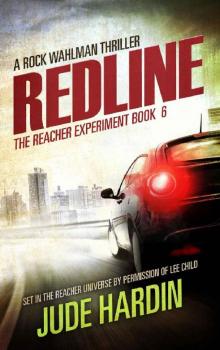 Redline: The Reacher Experiment Book 6 (The Jack Reacher Experiment)
Redline: The Reacher Experiment Book 6 (The Jack Reacher Experiment) Fugitive
Fugitive Fire and ice dm-8
Fire and ice dm-8 American PI
American PI THE JACK REACHER FILES: ANNEX 1 (A Novel of Suspense)
THE JACK REACHER FILES: ANNEX 1 (A Novel of Suspense) THE JACK REACHER FILES: VELOCITY (with bonus thriller CROSSCUT)
THE JACK REACHER FILES: VELOCITY (with bonus thriller CROSSCUT) The Reacher Experiment
The Reacher Experiment Hostage
Hostage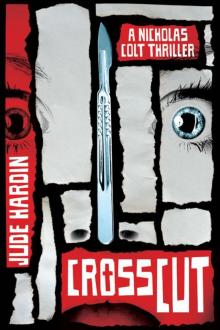 Crosscut (A Nicholas Colt Thriller Book 2)
Crosscut (A Nicholas Colt Thriller Book 2) Lady 52: A Jack Daniels/Nicholas Colt Novel
Lady 52: A Jack Daniels/Nicholas Colt Novel